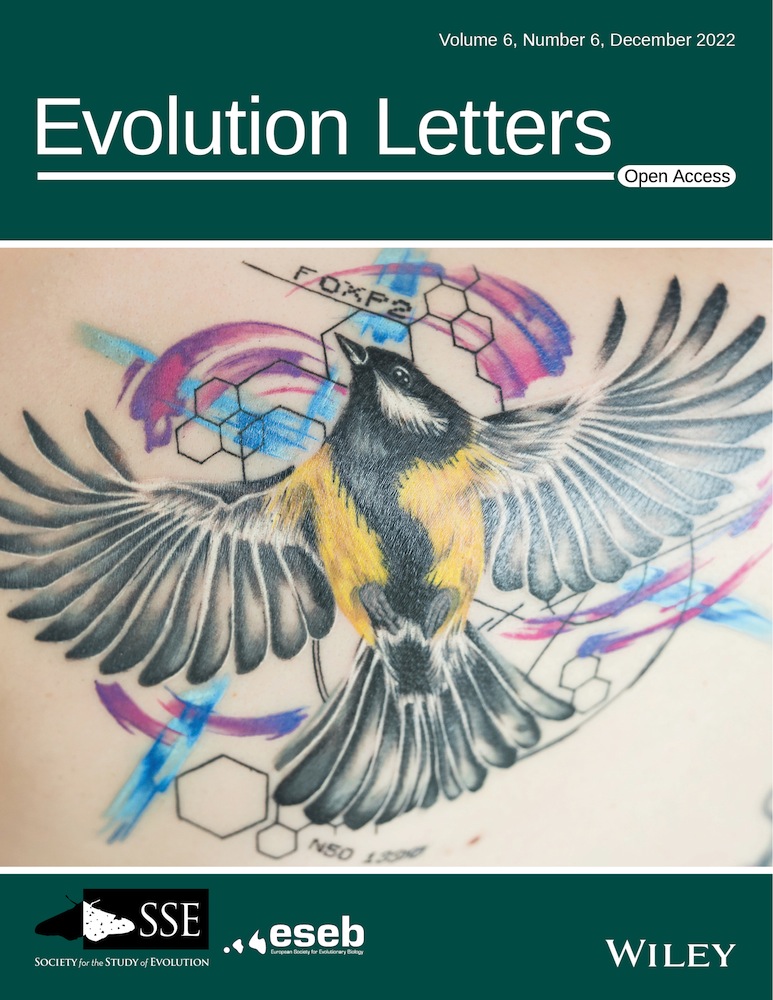Host–pathogen coevolution promotes the evolution of general, broad-spectrum resistance and reduces foreign pathogen spillover risk
IF 3.7
1区 生物学
Q2 EVOLUTIONARY BIOLOGY
引用次数: 0
Abstract
Abstract Genetic variation for disease resistance within host populations can strongly impact the spread of endemic pathogens. In plants, recent work has shown that within-population variation in resistance can also affect the transmission of foreign spillover pathogens if that resistance is general. However, most hosts also possess specific resistance mechanisms that provide strong defenses against coevolved endemic pathogens. Here we use a modeling approach to ask how antagonistic coevolution between hosts and their endemic pathogen at the specific resistance locus can affect the frequency of general resistance, and therefore a host’s vulnerability to foreign pathogens. We develop a two-locus model with variable recombination that incorporates both general resistance (effective against all pathogens) and specific resistance (effective against endemic pathogens only). With coevolution, when pathogens can evolve to evade specific resistance, we find that the regions where general resistance can evolve are greatly expanded, decreasing the risk of foreign pathogen invasion. Furthermore, coevolution greatly expands the conditions that maintain polymorphisms at both resistance loci, thereby driving greater genetic diversity within host populations. This genetic diversity often leads to positive correlations between host resistance to foreign and endemic pathogens, similar to those observed in natural populations. However, if resistance loci become linked, the resistance correlations can shift to negative. If we include a third linkage-modifying locus in our model, we find that selection often favors complete linkage. Our model demonstrates how coevolutionary dynamics with an endemic pathogen can mold the resistance structure of host populations in ways that affect its susceptibility to foreign pathogen spillovers, and that the nature of these outcomes depends on resistance costs, as well as the degree of linkage between resistance genes.宿主-病原体共同进化促进了一般广谱耐药性的进化,减少了外来病原体溢出的风险
宿主群体内抗病基因变异对地方性病原体的传播有重要影响。在植物中,最近的研究表明,如果抗性是普遍的,那么种群内的抗性变异也会影响外来外溢病原体的传播。然而,大多数宿主也具有特定的抗性机制,为共同进化的地方性病原体提供强大的防御。在这里,我们使用建模方法来询问宿主与其特定抗性位点的地方性病原体之间的拮抗共同进化如何影响一般抗性的频率,从而影响宿主对外来病原体的脆弱性。我们开发了一个具有可变重组的双位点模型,该模型结合了一般抗性(对所有病原体有效)和特异性抗性(仅对地方性病原体有效)。通过共同进化,当病原体可以进化以逃避特定抗性时,我们发现可以进化一般抗性的区域大大扩大,从而降低了外来病原体入侵的风险。此外,共同进化极大地扩展了维持两个抗性位点多态性的条件,从而在宿主群体中推动了更大的遗传多样性。这种遗传多样性往往导致宿主对外来病原体和地方性病原体的抗性之间存在正相关关系,类似于在自然种群中观察到的情况。然而,如果抗性位点连接起来,抗性相关性可以变为负相关。如果我们在模型中加入第三个连锁修饰位点,我们发现选择往往倾向于完全连锁。我们的模型展示了与地方性病原体的共同进化动态如何以影响其对外来病原体溢出的易感性的方式塑造宿主种群的抗性结构,并且这些结果的性质取决于抗性成本以及抗性基因之间的联系程度。
本文章由计算机程序翻译,如有差异,请以英文原文为准。
求助全文
约1分钟内获得全文
求助全文
来源期刊

Evolution Letters
EVOLUTIONARY BIOLOGY-
CiteScore
13.00
自引率
2.00%
发文量
35
审稿时长
10 weeks
期刊介绍:
Evolution Letters publishes cutting-edge new research in all areas of Evolutionary Biology.
Available exclusively online, and entirely open access, Evolution Letters consists of Letters - original pieces of research which form the bulk of papers - and Comments and Opinion - a forum for highlighting timely new research ideas for the evolutionary community.
 求助内容:
求助内容: 应助结果提醒方式:
应助结果提醒方式:


